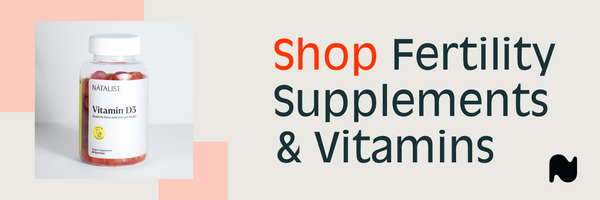Risks of Ovulation Induction Medications

By Halle Tecco, MPH, MBA
If you are having trouble getting pregnant, you may be looking into ovulation induction medications to help. But is it safe to take them? And will they even work? In this guide, we’ll talk through some of the most common types of ovulation induction medications and what you need to know about the risks and benefits.
First off, what are ovulation induction medications?
Ovulation induction may be words you are not familiar with, so let’s break it down:
- Ovulation is the release of the egg from the ovary during your fertile window. Without ovulation, there is no egg to fertilize. With no egg to fertilize, there’s no baby.
- Induction is a fancy word for the process of making something happen.
So ovulation induction is the process of helping your body release an egg in order to get pregnant. And ovulation induction medications are pills you may be prescribed to help boost the chances of pregnancy. [1] These medications are commonly prescribed to women who have polycystic ovary syndrome (PCOS) or other conditions that cause irregular ovulation. [1-2]
What medications induce ovulation?
There are several different types of ovulation induction medications, including [2]:
- Clomiphene citrate (ClomidⓇ): This is a non-steroidal medication that works by blocking estrogen receptors in the brain, which triggers the pituitary gland to increase the production of luteinizing hormone (LH) and follicle-stimulating hormone (FSH). [2] These hormones then stimulate the ovaries to produce an egg. Learn what to expect when taking Clomid® for PCOS.
- Letrozole (FemaraⓇ): This medication is similar to ClomidⓇ, but it works by reducing the amount of estrogen in the body. Letrozole is gaining popularity as multiple studies show that letrozole may be slightly more effective in those with PCOS. [3-4] It is important to note that letrozole isn’t FDA approved for ovulation induction, but is actually approved for the treatment of estrogen-sensitive breast cancer in postmenopausal people. Because it can stimulate ovulation in some cases, it has gained widespread off-label use as a treatment for infertility. [5]
- Gonadotropins: These are hormones that are similar to LH and FSH, and they are administered as injections (shots). [6] Gonadotropins are typically used during in vitro fertilization (IVF) and in women who do not respond to clomiphene citrate or letrozole. [6]
- Metformin: This medication is primarily used to treat diabetes, but is also used off-label to help to improve ovulation in women with PCOS. [7] Metformin helps the body use insulin more effectively and can improve function of several organs and tissues impacted by insulin resistance, including the ovaries. [7]
These are all prescription medications and should only be used under the close supervision of a healthcare provider.
What is a trigger shot?
A trigger shot, also known as a human chorionic gonadotropin (hCG) shot, is a gonadotropin therapy medication that is generally used in the final stages of some fertility treatments. [8] The trigger shot contains hCG (which is also the pregnancy hormone!) which causes the egg(s) to be released from the ovaries.
Timing of the trigger shot is key, as some studies indicate that ovulation occurs 36 to 48 hours after the shot. [9] While you generally self-administer this shot, it is part of a larger fertility treatment which is monitored closely through ultrasound and blood tests.
Is ovulation induction harmful?
Ovulation induction medications are generally considered safe when used as directed under the supervision of a healthcare provider.
However, like any medication, they can have potential side effects. Common side effects of ovulation induction medications (specifically Clomid® and letrozole) include [10-11]:
- Hot flashes
- Headaches
- Nausea
- Mood swings
- Breast tenderness
Additionally, side effects can include abdominal pain, vision disturbances, cancer, congenital abnormalities (clomiphene only), bone density loss (letrozole only), multiple pregnancies, or kidney damage after prolonged use. [10-13]
Ovarian hyperstimulation syndrome (OHSS) is a rare but serious condition that can occur with ovulation induction medications, especially in women who are at a higher risk for OHSS, such as those with polycystic ovary syndrome (PCOS). [1-2] OHSS can cause enlarged ovaries, abdominal pain, and fluid accumulation in the abdominal cavity. In rare cases, it can be life threatening.
Why do ovulation inductions fail?
The truth is, like most fertility treatments, these medications don’t always work. [1] We always hope for the best, but sometimes fertility treatments don’t solve the problem. And sometimes the problem is simply bad luck.
There are several reasons why ovulation induction medications may fail to induce ovulation [14-15]:
- Wrong dosage: If the dosage of the medication is not high enough, it may not be effective in stimulating ovulation. In this case, your provider may increase the dosage. [2]
- Poor response: Some women may not respond well to certain ovulation induction medications, such as Clomid® or letrozole and may require a different medication or a higher dosage. [1-2]
- Ovarian resistance: Resistant Ovary Syndrome is a rare condition in which the ovaries do not respond to the stimulation of ovulation induction medications. [16]
- Another underlying medical condition: Certain medical conditions, such as thyroid disorders or pituitary tumors, can interfere with ovulation and may need to be treated before ovulation induction medications can be effective. [2]
- Age: As a woman's age increases, the likelihood of ovulation induction medications working decreases. [17]
- Uterine or cervical factors: Certain structural or functional issues in the uterus or cervix can prevent a fertilized egg from implanting and developing normally. [18]
- Bad luck: Most of the time, a cycle just doesn’t work and there’s nothing that you could do differently to change it.
Because ovulation induction medications are given under the guidance of a healthcare professional, they will work with you month over month. If you’re still not getting pregnant, they may advise additional testing or treatment.
How successful is ovulation induction?
The success rate of ovulation induction varies depending on several factors, including the underlying cause of infertility, the medication and dosage being used, and the age, BMI, and overall fertility of the woman.
Ovulation induction medications have a high success rate in women who have PCOS. [19] One study found that ovulation induction with Clomid® or letrozole can result in ovulation in 60-73% of cycles in women with PCOS. [19]
But while ovulation induction medications are pretty good at helping you ovulate, that doesn’t always mean they’ll help you get pregnant.
Which is the best ovulation induction medication?
There is no one "best" ovulation induction medication, as different medications may be more effective for certain individuals depending on their specific infertility diagnosis and medical history.
The two most common medications are letrozole and Clomid®. In those with PCOS, letrozole seems to have higher live birth rates compared to clomiphene citrate, although it also appears to have higher neonatal complications in women with PCOS. In cases of isolated anovulation or unexplained infertility, clomiphene citrate results in higher birth rates.
|
Live birth rate [3,20-22] |
Clomiphene citrate |
Letrozole |
|
RS Legro, GS Brzyski, et all (PCOS patients) |
19.1% |
27.5% |
|
SA Amer, J Smith , et all (PCOS patients) |
19.4% |
24.4% |
|
Seyedoshohadaei F, Zandvakily F, Shahgeibi S (non PCOS patients) |
44% |
42% |
|
Diamond M.P, Legro R.S, Coutifaris C, et all (non PCOS patients) |
23.3% |
18.7% |
Are there other ways to induce ovulation besides medications?
Most people suffering from anovulation benefit from lifestyle changes, such as getting to a healthy BMI, reducing stress, exercising regularly, avoiding recreational drugs, and getting the right nutrients. [23] You have a greater chance of getting pregnant and carrying a healthy pregnancy if you’re healthy overall. You can also get a read on all of your essential fertility hormones using at home hormone testing kits.
If you’re a cigarette smoker, it’s time to actively quit. Smoking can disrupt the menstrual cycle and lead to anovulation, making it more difficult to become pregnant. [24] Smoking can also reduce the number and quality of eggs, which can further decrease fertility. Not only that, but if you do get pregnant, the chemicals in tobacco smoke can damage the DNA in eggs, which can lead to chromosomal abnormalities and increase the risk of miscarriage. [25]
Quitting smoking is an important step for improving fertility and increasing the chances of a healthy pregnancy. If you are trying to become pregnant and currently smoke, it's important to talk to your healthcare provider about quitting and available resources to help you stop smoking.
Supplements can also be used to complement a healthy lifestyle. This can include:
- A prenatal vitamin: The American College of Obstetrics and Gynecology recommends that those trying to get pregnant take a prenatal multivitamin. [26]
- Myo-Inositol: Inositol can help support ovarian health and egg health while promoting healthy hormone levels. [27] Studies have shown that inositol may help regulate menstrual cycles and improve ovulation in women with PCOS. [28]
- CoQ10: CoQ10 can help support egg quality. [29] Emerging research suggests that maintaining healthy CoQ10 levels may improve egg quality and pregnancy rates for women over 35. [30]
As always, consult your healthcare provider before adding any supplements to your regimen.
TL;DR
Ovulation induction medications, like Clomid® and letrozole, are a common, relatively inexpensive option for treatment of infertility. Ovulation induction medications are generally considered safe when used as directed under the supervision of a healthcare provider. Many women choose to try these medications to get pregnant before moving on to more invasive and expensive testing and procedures.
References:
- Sharma M, Balasundaram P. Ovulation Induction Techniques. [Updated 2023 Mar 8]. In: StatPearls [Internet]. Treasure Island (FL): StatPearls Publishing; 2023 Jan-. Available from: https://www.ncbi.nlm.nih.gov/books/NBK574564/
- Mbi Feh MK, Wadhwa R. Clomiphene. [Updated 2022 Jun 27]. In: StatPearls [Internet]. Treasure Island (FL): StatPearls Publishing; 2023 Jan-. Available from: https://www.ncbi.nlm.nih.gov/books/NBK559292/
- Legro RS, Brzyski RG, Diamond MP, et al. Letrozole versus clomiphene for infertility in the polycystic ovary syndrome [published correction appears in N Engl J Med. 2014 Oct 9;317(15):1465]. N Engl J Med. 2014;371(2):119-129. doi:10.1056/NEJMoa1313517
- Amer SA, Smith J, Mahran A, Fox P, Fakis A. Double-blind randomized controlled trial of letrozole versus clomiphene citrate in subfertile women with polycystic ovarian syndrome. Hum Reprod. 2017;32(8):1631-1638. doi:10.1093/humrep/dex227
- Understanding Unapproved Use of Approved Drugs "Off Label” U.S. Food & Drug Administration. Accessed March 2023. URL.
- Use of exogenous gonadotropins for ovulation induction in anovulatory women: a committee opinion. Practice Committees of the American Society for Reproductive Medicine and Society for Reproductive Endocrinology and Infertility. Fertility and Sterility® Vol. 113, No. 1, January 2020 0015-0282/
- Sharpe A, Morley LC, Tang T, Norman RJ, Balen AH. Metformin for ovulation induction (excluding gonadotrophins) in women with polycystic ovary syndrome. Cochrane Database Syst Rev. 2019;12(12):CD013505. Published 2019 Dec 17. doi:10.1002/14651858.CD013505
- Chung RK, Mancuso AC, Summers KM, Sparks AE, Duran HE, Mejia RB. Dual trigger protocol is an effective in vitro fertilization strategy in both normal and high responders without compromising pregnancy outcomes in fresh cycles. F S Rep. 2021;2(3):314-319. Published 2021 May 27. doi:10.1016/j.xfre.2021.05.008
- Firouz M, Noori N, Ghasemi M, Dashipour A, Keikha N. Comparing the Effectiveness of Doing Intra-uterine Insemination 36 and 42 Hours After Human Chorionic Gonadotropin (HCG) Injection on Pregnancy Rate: A Randomized Clinical Trial. J Family Reprod Health. 2020;14(3):173-179. doi:10.18502/jfrh.v14i3.4670
- Medications for Inducing Ovulation, A Guide for Patients.AMERICAN SOCIETY FOR REPRODUCTIVE MEDICINE. Revised 2016. URL.
- Legro RS, Brzyski RG, Diamond MP, et al. Letrozole versus clomiphene for infertility in the polycystic ovary syndrome [published correction appears in N Engl J Med. 2014 Oct 9;317(15):1465]. N Engl J Med. 2014;371(2):119-129. doi:10.1056/NEJMoa1313517
- Rebar R. Sperm Disorders. Western Michigan University School of Medicine. Revised Sep 2022. URL.
- https://www.accessdata.fda.gov/drugsatfda_docs/label/2012/016131s026lbl.pdf CLOMID® (clomiphene citrate tablets USP). U.S. Food & Drug Administration. Reference ID: 3206435. URL.
- Roy Homburg, Clomiphene citrate—end of an era? a mini-review, Human Reproduction, Volume 20, Issue 8, August 2005, Pages 2043–2051, https://doi.org/10.1093/humrep/dei042
- Palihawadana TS, Wijesinghe PS, Seneviratne HR. Factors associated with nonresponse to ovulation induction using letrozole among women with World Health Organization group II anovulation. J Hum Reprod Sci. 2015;8(2):75-79. doi:10.4103/0974-1208.158598
- Samsami A, Davoodi S, Ghasmpour L, Moradi Alamdarloo S, Rahmati J, Karimian A. Gonadotropin-Resistant Ovary Syndrome Presented with Secondary Amenorrhea and Infertility: A Case Report. Iran J Med Sci. 2020;45(2):140-142. doi:10.30476/ijms.2019.81965.
- Alviggi C, Humaidan P, Howles CM, Tredway D, Hillier SG. Biological versus chronological ovarian age: implications for assisted reproductive technology. Reprod Biol Endocrinol. 2009;7:101. Published 2009 Sep 22. doi:10.1186/1477-7827-7-101
- What are some possible causes of female infertility? National Institutes of Health Office of Communications. Reviewed 2017. URL.
- Kar S. Clomiphene citrate or letrozole as first-line ovulation induction drug in infertile PCOS women: A prospective randomized trial. J Hum Reprod Sci. 2012;5(3):262-265. doi:10.4103/0974-1208.106338
- Amer SA, Smith J, Mahran A, Fox P, Fakis A. Double-blind randomized controlled trial of letrozole versus clomiphene citrate in subfertile women with polycystic ovarian syndrome. Hum Reprod. 2017;32(8):1631-1638. doi:10.1093/humrep/dex227
- Seyedoshohadaei F, Zandvakily F, Shahgeibi S. Comparison of the effectiveness of clomiphene citrate, tamoxifen and letrozole in ovulation induction in infertility due to isolated unovulation. Iran J Reprod Med. 2012;10(6):531-536.
- Diamond MP, Legro RS, Coutifaris C, et al. Letrozole, Gonadotropin, or Clomiphene for Unexplained Infertility. N Engl J Med. 2015;373(13):1230-1240. doi:10.1056/NEJMoa1414827
- Chavarro JE, Rich-Edwards JW, Rosner BA, Willett WC. Diet and lifestyle in the prevention of ovulatory disorder infertility. Obstet Gynecol. 2007;110(5):1050-1058. doi:10.1097/01.AOG.0000287293.25465.e1
- Van Voorhis BJ, Dawson JD, Stovall DW, Sparks AE, Syrop CH. The effects of smoking on ovarian function and fertility during assisted reproduction cycles. Obstet Gynecol. 1996;88(5):785-791. doi:10.1016/0029-7844(96)00286-4
- Centers for Disease Control and Prevention (US); National Center for Chronic Disease Prevention and Health Promotion (US); Office on Smoking and Health (US). How Tobacco Smoke Causes Disease: The Biology and Behavioral Basis for Smoking-Attributable Disease: A Report of the Surgeon General. Atlanta (GA): Centers for Disease Control and Prevention (US); 2010. 8, Reproductive and Developmental Effects. Available from: https://www.ncbi.nlm.nih.gov/books/NBK53022/
- Good Health Before Pregnancy: Prepregnancy Care. American College of Obstetrics and Gynecology. Revised December 2021. URL.
- Ciotta L, Stracquadanio M, Pagano I, Carbonaro A, Palumbo M, Gulino F. Effects of myo-inositol supplementation on oocyte's quality in PCOS patients: a double blind trial. Eur Rev Med Pharmacol Sci. 2011;15(5):509-514.
- Pundir J, Psaroudakis D, Savnur P, et al. Inositol treatment of anovulation in women with polycystic ovary syndrome: a meta-analysis of randomised trials. BJOG. 2018;125(3):299-308. doi:10.1111/1471-0528.14754
- Xu Y, Nisenblat V, Lu C, et al. Pretreatment with coenzyme Q10 improves ovarian response and embryo quality in low-prognosis young women with decreased ovarian reserve: a randomized controlled trial. Reprod Biol Endocrinol. 2018;16(1):29. Published 2018 Mar 27. doi:10.1186/s12958-018-0343-0
- Akarsu S, Gode F, Isik AZ, Dikmen ZG, Tekindal MA. The association between coenzyme Q10 concentrations in follicular fluid with embryo morphokinetics and pregnancy rate in assisted reproductive techniques [published correction appears in J Assist Reprod Genet. 2017 May;34(5):607]. J Assist Reprod Genet. 2017;34(5):599-605. doi:10.1007/s10815-017-0882-x
Reach Out, We're Here
Have questions about your order or products? For the speediest answer, check out our FAQ section. Need something else? Come find us below.
Please keep in mind our regular business hours; Monday-Friday, 9am-5pm CT.
Customer Support
support@natalist.com
Press Inquiries
media@everlyhealth.com
Business & Partnerships
team@natalist.com
Affiliates + Influencers
team@natalist.com
Job Openings
Careers Page
























